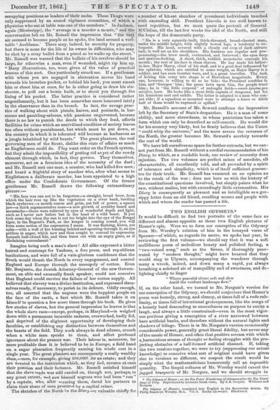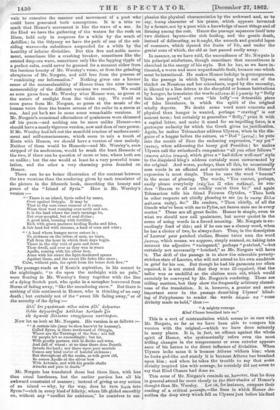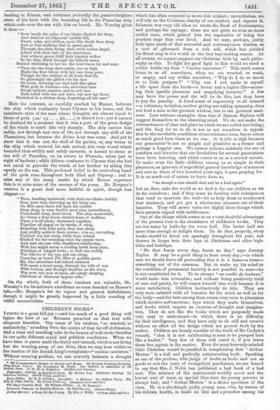TWO ENGLISH ODYSSEYS.* Ix would be difficult to find two
portraits of the same face so different and almost opposite as these two English pictures of Homer's epic, Were we to form our conception of the Odyssey from Mr. Worsley's solution of him in the honeyed verse of Spenser—of which, as regards its metre, we spoke last year, in reviewing the first volume—we should say that it was a soft mellifluous poem of melodious beauty and polished feeling, a "two-voiced song," such as the Sirens, if thoroughly pene- trated by "modern thought," might have boasted that they would sing to Ulysses, accompanying the wanderer through many a wreck, indeed, and down many a rapid, yet always breathing a subdued air of tranquillity and of sweetness, and de- lighting chiefly to linger
"Where peaceful rivers soft and alow Amid the verdant landscape flow."
If, on the other hand, we turned to Mr. Norgate's version for our conception of the Odyssey, we should conjecture that Homer's poem was homely, strong, and clumsy, at times full of a rude sub- limity, at times full of intentional grotesqueness, like the songs or a homely bard descending to uncouthness on purpose to excite a laugh, and always a little constrained—even in the most vigor- ous portions giving a conception of a river narrowed betweea bare artificial banks, and therefore without the natural lights anti shadows of foliage. There is in Mr.Norgate's version occasionally considerable power, generally great literal fidelity, but never any of the music of Homer, and often that positive scream with which, a_harmonious stream of thought or feeling struggles with the pro- jecting obstacles of a half-formed artificial channel. If, taking the two versions together, we were to try (suppressing our actual knowledge) to conceive what sort of original could have givers rise to versions so different, we suspect the result would be simply what the mathematicians hutnorously call an impossible quantity. The limpid softness of Mr. Worsley would cancel the jagged brusquerie of Mr. Norgate, and we should struggle in • 77,e Odyssey of Horner ; or,ehe Ten non Iraederiag of Odessa gfier the Ten Deere Siege of Troy. Reproduced in dnunallo blank Irene. By 1.5. Norgate. Williams and Borgia.
The Odyssey of Homer; translated into English In the Spenserian stanza. By
Philip Stanhope Woraley, M.A. Vol. 11. Books Blackwood
vain to conceive the manner and movement of a poet who could have generated both conceptions. It is a trite re- mark that Homer's movement is like the wave of a sea. In the Iliad we have the gathering of the waters for the rush on Ilium, held only in suspense for a while by the wrath of Achilles; in the Odyssey we have the path of one of the sub siding waves—its subsidence suspended for a while by the hostility of inferior divinities. But this free and noble move- ment, sometimes like a crashing breaker, sometimes like the -crested deep-sea wave, sometimes only like the lapping ripple of a perfect calm, could never be guessed for a moment either from the luscious beauty of Mr. Worsley's verse, or from the grinding abruptness of Mr. Norgate, and still less from the process of " combining our information." Nothing gives one a keener sense of the untranslatability of Homer than the utter incom- mensurability of the different versions we receive. We could as soon guess from Mr. Worsley what Homer was, as guess at the nature of sunlight from the violet ray. We could as soon guess from Mr. Norgate, as guess at the music of the human voice from the hoarse scream of the sailor in a storm at sea. And yet both are in some sense remarkable versions. If Mr. Norgate's occasional affectations of quaintness were skimmed off his poem—and nothing can be more unlike Homer—we should have a manly vigorous version, now and then of rare power. If Mr. Worsley had left out the manifold touches of modern senti- ment and self-consciousness, which seem to mix a touch of Keats with Homer, we should have a version of rare melody. Neither of them wonld be Homeric—and Mr. Worsley's, even stripped of its modernism, would be much the least Homeric of -the two, if there can be question of more or lees, where both are so unlike ; but the one would at least be a very powerful trans- lation, and the other a very charming poem founded on Homer.
There can be no better illustration of the contrast between the two versions than the rendering given by each translator of the picture in the fifteenth book, describing the beauty and peace of the "Island of Syria." Here is Mr. Woraley's version :— " There is an island,. Syria called by name, Over against Ortygm. It may be That to thy ears some rumour of it came, When thou west rooming over earth and sea.
It is the land where the sun's turnings be, Not over-peopled, but of soul divine ; A good land, teeming with fertility, Rich with green pastures feeding flocks and kiss, A fair land fed with streams, a land of corn and wine; "'A land whore hunger never enters in ; No sickness on the tribes of men, no tears, Fall from the hour in which their days begin. There in the city void of pain and fears They dwell, and over as they wax in years Apollo, coming with his silver bow, Aims with his eister the light-feathered spears Against them, and the sweet life fades like snow; Calm, without pain, the spirit from the bones doth flow."
'The passage reads as if Keats's aspiration, in his sonnet to the nightingale, "to die upon the midnight with no pain," were floating in Mr. Woreley's fancy together with the line of a dying Scotch poet, who spoke in a metaphor borrowed from Bums of fading away, "like the unendming snow." But there is nothing of this sentiment in Homer, who is thinking of an easy death ; but certainly not of the "sweet life fading away," or of the serenity of the dying :— ir 771P404.41 vriXty raira ctroponron aBiav ecpyup6roEor Ar6XXso Aprins3/ iw oTt clyamir galgoon, arsticeoeer xotrivtiorts.
Now let us look at Mr. Norgate. His version is as follows :— "A certain isle (may be thou know'st by hearsay), Called Syros, is there northward of Ortygia, Whore are the Turnings of the Sim: not full Of people is't so exceedingly : but fat, With goodly pasture, rich in flocks and wine And full of wheat: at no time there does Dearth Invade the land ; nor there upon poor mortals Comes any kind steer of hateful sickness ; But throughout all the realm, as folk grow old, So conaes Apollo of the silver bow With Artemis, and with his gentle shafts Attacks and puts to death."
Mr. Norgate has translated these last three lines, with leas than usual harshness, but the earlier portion has all his awkward constraint of manner ; instead of giving us any notion of an island — why, by the way, does he turn siopis into Byres ?—rich in every kind of felicity, where life glided smoothly on, 'without any "conflict for existence," he contrives to em- phasize the physical characteristics by the awkward and, so to say, loamy character of his praise, which appears invented by a farmer, not by a poet with a knowledge of most things and of farming among the rest. Hence the passage separates itself into two distinct layers—the rich feeding, and the gentle death, instead of delineating, as it ought, the smooth and grateful lapse of summers, which ripened the fruits of life, and under the genial suns of which, the old at last passed easily away.
In manner, as we have said, the uncouthness of Mr. Norgate is his principal misfortune, though sometimes that uncouthness is absorbed in the energy of his style. But he has, as we have in- timated, a worse and more unpardonable fault, because one which must be intentional. He makes Homer indulge in grotesqueness. In the passage in which Ulysses, coming naked out of the thicket on Nausicaa and her attendants, urged by dire necessity, is likened to a lion driven to the sheepfold or human habitations by hunger, he translates the words zDartzr dii yaerp by "Belly bids him prowl," not even "his belly"—a detestable piece of false literalness, in which the spirit of the original wholly departs. No doubt some word more concrete and physical than hunger is wanted, perhaps "craving" is our nearest term; but certainly to generalize "Belly," print it with a capital letter, and make it stand for an impelling force, is a grotesque audacity for which the Greek gives to justification. Again, he makes Telemachus address Ulysses, when in the dis- guise of a beggar before the suitors, as " Dad " (nem) ; he puts into the month of Zeus the endearing expression, "my pet" (mem), when addressing the hoary god Poseidon ; he makes Ulysses call the swineherd's companions "all you other fellows" (oama &am irompos), which gives a" hail-fellow well-met" style to the disguised king's address certainly most unwarranted by the original. And worse, perhaps, than all this, he occasionally uses words in an affected and eccentric sense when Homer's expression is most simple. Thus he uses the word "buxom" in the sense of pleasing. The words, "You cannot, perhaps, easily please everybody (rsi,xlez i cast vobjears), he ren- ders "Buxom to all not readily can'st thou be ;" and again Telemachus tells his friend Peirasus Clytides, "Thou both in other respects art chiefly pleasing to me (au Ss ramp Macc Imiktora volOp), ftc." He renders, "Thou chiefly, of all the friends who've been with me to Pylos, art buxom unto me in every matter." These are all great faults. Homer is simple, even to what we should now call quaintness, but never quaint in the sense of using words in a forced meaning. Mr. Norgate is ex- ceedingly fond of this; and if Ile can use a clumsy word, when he has a choice of two, he always does. Thus, in the description of Laertes' poor patched clothes, Homer twice uses the word parnr, which means, we suppose, simply seamed, or, taking into account the adjective "variegated," perhaps "p atched,"—but certainly not necessarily "botched," as Mr. Norgate will have it. The drift of the passage is to show the miserable poverty- stricken state of Laertes, who will not attend to his own condition in grief for his son. But though he had his garments toe often repaired, it is not stated that they were ill-repaired, that the tailor was as unskilful as the clothes were old, which would certainly be conveyed by Mr. Rorgate's rendering. These are trifling matters, but they show the frequently arbitrary clumsi- ness of the translation. It is, however, a greater and more important error in the passage describing Ulysses' blind- ing of Polyphemus to render the words aritnsit frig "name divinity made no bold," thus :—
" A mighty courage
Kind Chance breathed into us."
This is a soft of mistranslation which seems to us rare with Mr. Norgate, so far as we have been able to compare his version with the original,—which we have done minutely in many places. It is, in fact, an offence against the whole spirit of Homer, who systematically refers even the most trifling changes in the temperament or even exterior appear.. ance of his heroes to the direct influence of divinities. 'When Ulysses looks mean it is because Atheae withers him; when he looks god-like and stately it is because Athena has breathed upon bins; and when be takes the trouble to say that some divinity inspired him with courage, he certainly did not mean to say that Kind Chance had done so.
This error of Mr. NOrgate's reminds us, however, that be does in general attend far more closely to the finer shades of Homer's thought than Mr. Worsley. Let us, for instance, compare their reading of a critical peeeage,—the lines in which Homer de- scribes the deep sleep which fell on Ulysses just before his final
landing in Ithaca, and contrasts pointedly the passive helpless state of his hero with the bounding life in the Phseacian ship which rode over the sea with him on board. Mr. Worsley gives it thus :—
" Soon 'neatla the pulse of oar-blades flashed the deep,
And slumber on Odysseus' eyelids fell, Sweet, calm, and stirless, more like death than sleep. And as four stallions that in speed excel, Through the plain flying, their swift course impel, Lifted with keen lash by the charioteer,
And without pause fulfil their journey well—
So the ship, lifted through the billowy mere Rushed whitening in her lee the loud waves far and near.
"Thus she the deep cave safely, nor on high Might the fleet falcon with her oars keep pace, Though far the swiftest of all fowls that fly, So glancingly she glided o'er the face Of ocean, carrying one that held like place With gods in wisdom—who adoretime bare Griefs without number, and in evil ease Sank tolled with war and wave, but now lay there, Stretched in a stirless sleep, forgetting all his care."
Here the contrast, so carefully marked by Homer, between the ship which exultantly bears Ulysses to his home, and the inanimate state of the man whose thoughts are almost equal to those of gods (sad v . . . is almost lost ; yet it cannot be doubted for a moment that it was a part of the great design of the whole to mark this very sharply. The ship carries him safely, not through any care of his, not through any skill of the Phseacians, but because the divine hour was come. And yet to show that it was not the skill of his guides, or; any virtue in the ship which secured his safe arrival, this very vessel which bounded thus swiftly and safely onwards, is turned to stone at the will of Poseidon, on its return to Phseacia, when just in sight of harbour ; while Athene confesses to Ulysses that she had not cared to provoke the wrath of her brother by aiding him openly on the sea. This profound belief in the overruling hand of the gods runs throughout both Iliad and Odyssey ; and to raise any of the many marks by which Homer expresses this is to miss some of the essence of the poem, Mr. Norgate's version is a great deal more faithful in spirit, though less elegant
Then, bending backward, with their oar-blades briekly Soon were they throwing up the briny sea, On Him anon there fell upon his eyelids Deep sleep, in very death's most near resemblance, Unwakeful sleep, most sweet. The ship meanwhile, As 'swore a four-horse chariot-team of stallions Upon a level plain; harnessed together, Together all urged on by stroke of whip, Bounding with lofty pace, they tear along And swiftly achieve their course ; e'en so, curvetting, Uplifted was her stem while from behind Bushed the far-sounding sea's big purple wave. And sure she ran with steadiness unfaltering: With her might never a circling hawk keep pace, Nimblest of winged fowls; so cleft she swiftly The billows of the sea, and ran along, Carrying on board The Man of godlike parts. fle, who aforetime had indeed endured Full many a heart-pang, through the toils of war With losmen, and through troubles on the wave, Was now, wag now at least, all calmly Bleeping, Oblivious of whatever bygone toils."
On the whole, both of these versions are valuable, Mr. Worsley's for its intrinsic excellence as verse founded on Homer's tale,—Mr. Norgate's for its vigour and general faithfulness, though it might be greatly improved by a little weeding of wilful eccentricities.
































 Previous page
Previous page